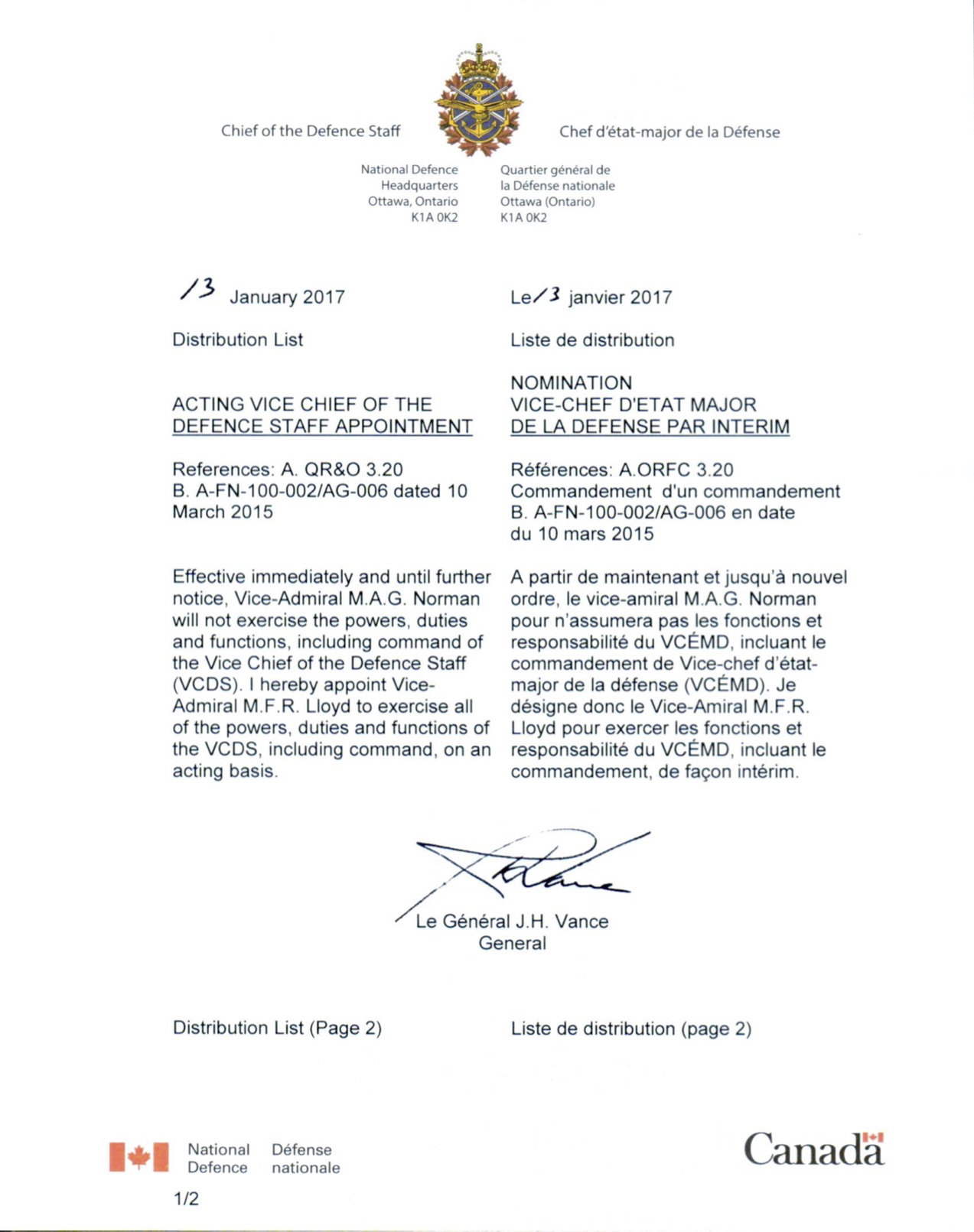In an 8 a.m. phone call, Vice-Admiral Mark Norman was removed from duty as the second-in-command for the Canadian Armed Forces, and details regarding why he was turfed are scant, at best.Norman was serving as vice-chief of the defense staff before he was suspended on Monday morning. Chief of Defense Staff Jonathan Vance announced the move in a letter to the entire military.Reports emerged from Postmedia and CTV News early on Monday, while the Globe & Mail, citing defense sources, is reporting that his removal may have to do with the exfiltration of secret documents. Firm confirmation of any kind has yet to come.One military source who spoke to VICE News said they were just as confused as everyone else.A spokesperson for Vance’s office would not answer VICE News’ questions on the reason behind the move, responding with the statement that Norman had been relieved from military duty “for the time being.”The statement suggests that Norman was not just relieved of his duty has vice-chief — number two in the military, behind Vance — but from military service altogether. Such a move suggests that the differences went beyond politics or differences of opinion.The office of Defense Minister Harjit Singh Sajjan refused to comment on, or off, the record, except to provide a very short statement from the minister himself.“I fully support the decision taken by the [chief of defense staff] to relieve the [vice chief of defense staff] from the performance of military duty,” Sajjan said in the statement. Norman represents the Canadian navy in the leadership of the armed forces, and beyond just pushing the military to beef up its naval presence, he helped respond to two massive problems the military has confronted in recent years: sexual harassment, and espionage.In 2012, the navy was rocked when Sub-Lieutenant Jeffrey Delisle was arrested for stealing sensitive naval intelligence and selling it to the Russians — he was only caught after five years of espionage. A year later, naval contractor Qing Quentin Huang was charged with espionage for trying to pass on technical data on Canadian naval vessels to China.Norman himself gave an interview to the Canadian Press after Huang’s arrest, on how to combat espionage in the Canadian military.“The results of the Delisle case were significant and widespread in terms of their impact on not only procedures and practices and rules and regulations, but in terms of what I would describe as a culture and behaviour related to security. There is a significantly heightened awareness. There is a significantly increased focus on security behaviour.”In a video posted on the Canadian Forces website, Vance and Norman specifically confront the second issue that has racked the forces in recent years: sexual misconduct. Vance himself has vowed to fight this problem by firing anyone from the forces who is found to be contributing to the “hostile sexualized environment” that has become “endemic” in the Canadian military.“We have to come to grips with this destructive behaviour, any destructive behaviour, but we’re here to talk about one specific type that undermines who we are and what we stand for as an institution,” Norman said in the taped event, adding later: “We have to scrutinize and sanction those on the deck plates who are not doing the right thing.”
Norman represents the Canadian navy in the leadership of the armed forces, and beyond just pushing the military to beef up its naval presence, he helped respond to two massive problems the military has confronted in recent years: sexual harassment, and espionage.In 2012, the navy was rocked when Sub-Lieutenant Jeffrey Delisle was arrested for stealing sensitive naval intelligence and selling it to the Russians — he was only caught after five years of espionage. A year later, naval contractor Qing Quentin Huang was charged with espionage for trying to pass on technical data on Canadian naval vessels to China.Norman himself gave an interview to the Canadian Press after Huang’s arrest, on how to combat espionage in the Canadian military.“The results of the Delisle case were significant and widespread in terms of their impact on not only procedures and practices and rules and regulations, but in terms of what I would describe as a culture and behaviour related to security. There is a significantly heightened awareness. There is a significantly increased focus on security behaviour.”In a video posted on the Canadian Forces website, Vance and Norman specifically confront the second issue that has racked the forces in recent years: sexual misconduct. Vance himself has vowed to fight this problem by firing anyone from the forces who is found to be contributing to the “hostile sexualized environment” that has become “endemic” in the Canadian military.“We have to come to grips with this destructive behaviour, any destructive behaviour, but we’re here to talk about one specific type that undermines who we are and what we stand for as an institution,” Norman said in the taped event, adding later: “We have to scrutinize and sanction those on the deck plates who are not doing the right thing.”
Advertisement

